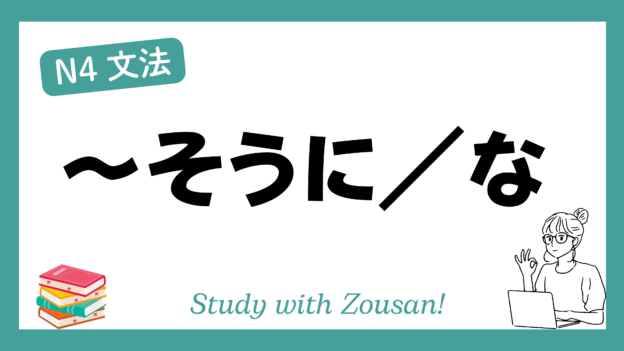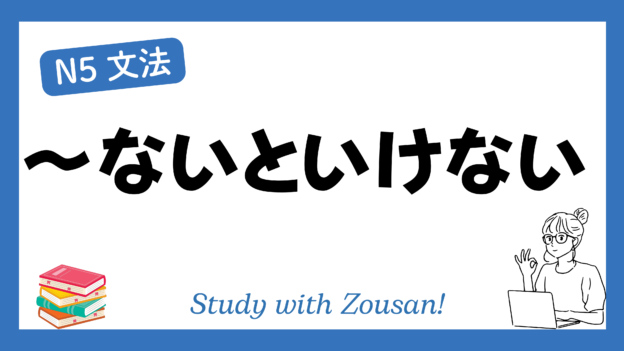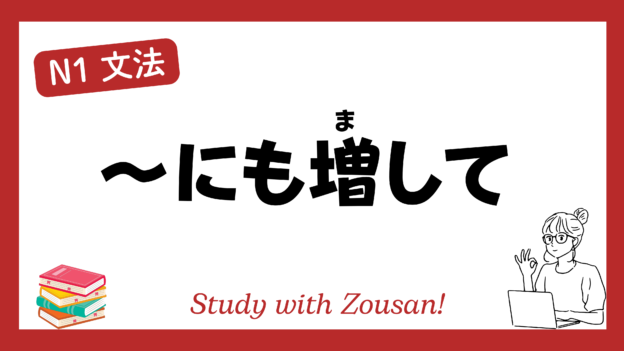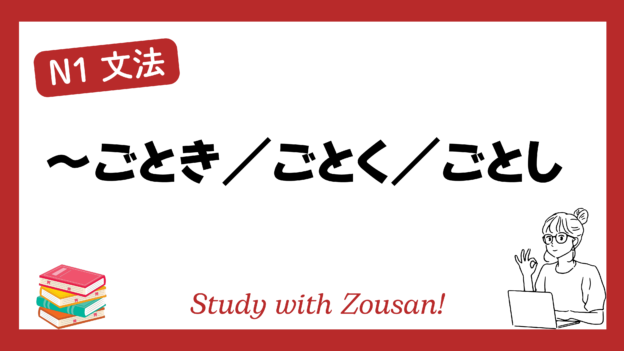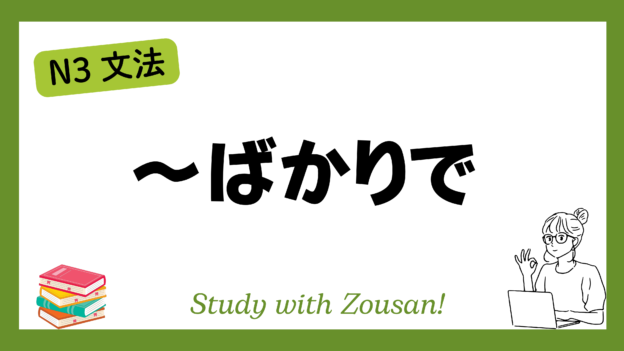N4文法:~そうに/そうな
Meaning: “Looks like…” / “Seems…”
~そうに/そうな is used to express the speaker’s impression or guess based on observation about someone’s or something’s condition or characteristics. This structure is used with adjectives and verbs to indicate that something “looks like” or “seems like” it is happening or will happen.
- ~そうな: Used before a noun to describe the quality or characteristic of something.
- ~そうに: Used before a verb to describe the manner or state of an action.
※Note:
・Do not use with adjectives that describe an evident truth, like 赤い (red), 大きい (big), 小さい (small), etc.
・For adjectives indicating states (good, beautiful, happy, etc.), change to ~そう to express that the speaker is predicting or commenting based on perception.
Structure:
| Verb |
+ そうに + Adj/Verb + そうな + Noun |
| な-adjective + だ | |
| い-adjective + |
Example:
1. ~そうな
-
-
-
🌟 楽しそうな人が集まっている。
(たのしそう な ひと が あつまって いる)
Happy-looking people are gathering. -
🌟 危なそうな道を歩いている。
(あぶなそう な みち を あるいて いる)
I’m walking on a dangerous-looking road. -
🌟 おいしそうなケーキがテーブルにあります。
(おいしそう な ケーキ が テーブル に あります)
There is a delicious-looking cake on the table. -
🌟 彼は元気そうな顔をしている。
(かれ は げんきそう な かお を している)
He has a healthy-looking face. -
🌟 眠そうな子供が座っている。
(ねむそう な こども が すわって いる)
A sleepy-looking child is sitting. -
🌟 楽しそうなイベントに参加したい。
(たのしそう な イベント に さんか したい)
I want to participate in a fun-looking event. -
🌟 悲しそうな表情をしている。
(かなしそう な ひょうじょう を している)
He has a sad-looking expression. -
🌟 危なそうな場所には行かないでください。
(あぶなそう な ばしょ に は いかないで ください)
Please don’t go to dangerous-looking places. -
🌟 暇そうな学生が公園にいる。
(ひまそう な がくせい が こうえん に いる)
There are bored-looking students in the park. -
🌟 彼女は嬉しそうな笑顔を見せた。
(かのじょ は うれしそう な えがお を みせた)
She showed a happy-looking smile.
-
-
2. ~そうに
-
-
-
🌟 彼は楽しそうに歌っています。
(かれ は たのしそう に うたって います)
He is singing happily. -
🌟 彼女は悲しそうに泣いていた。
(かのじょ は かなしそう に ないて いた)
She was crying sadly. -
🌟 その犬はうれしそうに尻尾を振っている。
(その いぬ は うれしそう に しっぽ を ふって いる)
The dog is wagging its tail happily. -
🌟 彼は疲れたそうに座っていた。
(かれ は つかれた そう に すわって いた)
He was sitting tiredly. -
🌟 子供たちは楽しそうに遊んでいる。
(こどもたち は たのしそう に あそんで いる)
The children are playing happily. -
🌟 彼女は恥ずかしそうに顔を赤らめた。
(かのじょ は はずかしそう に かお を あからめた)
She blushed embarrassedly. -
🌟 猫は気持ちよさそうに寝ている。
(ねこ は きもちよさそう に ねて いる)
The cat is sleeping comfortably. -
🌟 彼は不安そうに時計を見ている。
(かれ は ふあんそう に とけい を みて いる)
He is looking at his watch anxiously. -
🌟 彼女は楽しそうに話している。
(かのじょ は たのしそう に はなして いる)
She is talking happily. -
🌟 彼は怒りそうに私を見た。
(かれ は おこりそう に わたし を みた)
He looked at me angrily.
-
-



